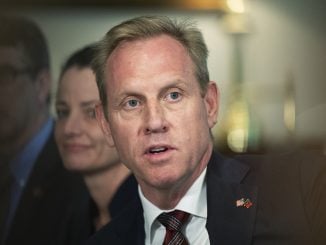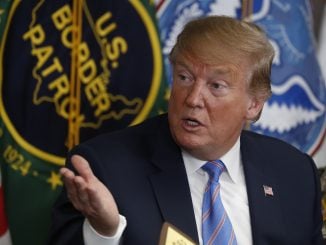WASHINGTON, D.C. — The top U.S. military officer told Congress on Tuesday that he knew former President Donald Trump wasn’t planning to attack China and that it was his job to reassure the Chinese of that fact in the phone calls that have outraged some lawmakers.
Army Gen. Mark Milley, chairman of the Joint Chiefs of Staff, delivered a full-throated defense of two calls he made to his Chinese counterpart, saying he was responding to “concerning intelligence” that China was worried about a U.S. attack.
“I know, I am certain, that President Trump did not intend to attack the Chinese. … And it was my directed responsibility by the secretary to convey that intent to the Chinese,” Milley told the Senate Armed Services Committee on Tuesday. “My task at that time was to de-escalate. My message again was consistent: Stay calm, steady, and de-escalate. We are not going to attack you.”
Milley has been at the center of a firestorm after reports that he made two calls to Gen. Li Zuocheng of the People’s Liberation Army to assure him that the United States was not suddenly going to go to war with or attack China. Details of the calls were first aired in excerpts from the recently released book “Peril” by Washington Post journalists Bob Woodward and Robert Costa.
Some U.S. lawmakers have said Milley overstepped his authority, and they have called for President Joe Biden to fire him. Trump blasted Milley as treasonous, called him “a complete nutjob” and said Milley “never told me about calls being made to China.”
In his most extensive comments to date on the matter, Milley said the calls on Oct. 30 and Jan. 8 were fully coordinated with the defense secretaries at the time as well as other U.S. national security agencies. And he said that such military-to-military communications are critical to prevent war between great powers that possess nuclear weapons.
The calls came during Trump’s last months in office as he challenged the results of the 2020 election.
Milley said the October call was made at the direction of then-Defense Secretary Mark Esper and the second was done at the request of the Chinese and coordinated with then-acting Defense Secretary Chris Miller’s office.
Milley also addressed a call he received from House Speaker Nancy Pelosi. He said Pelosi “called me to inquire about the president’s ability to launch nuclear weapons. I sought to assure her that nuclear launch is governed by a very specific and deliberate process.”
He said he assured her that while the president is the sole nuclear launch authority, “he doesn’t launch them alone.” He said that as chairman he is part of the launch decision process.
“There are processes, protocols and procedures in place, and I repeatedly assured her there is no chance of an illegal, unauthorized or accidental launch,” Milley said.
The book asserts that during the call, Milley agreed with Pelosi’s statement that Trump was suffering a mental decline after the election. During Tuesday’s hearing, Milley appeared to discount that, saying “I am not qualified to determine the mental health of the president of the United States.”
“At no time was I attempting to change or influence the process, usurp authority or insert myself in the chain of command, but I am expected, I am required, to give my advice and ensure that the president is fully informed,” Milley said.



